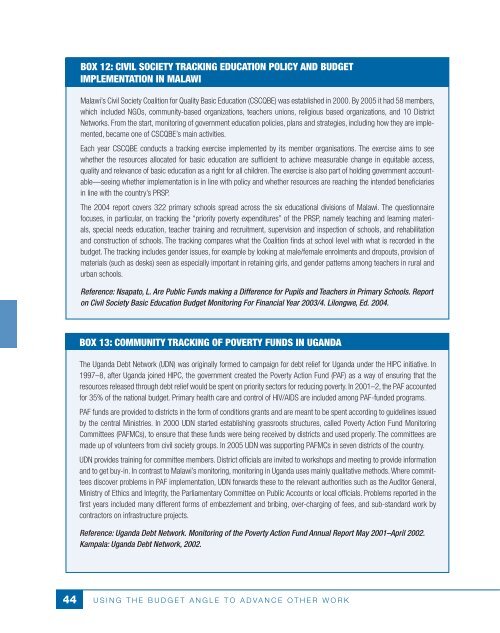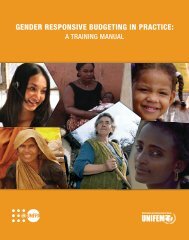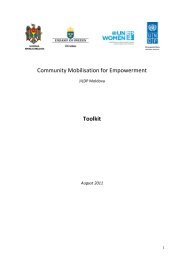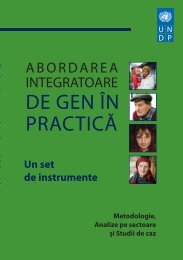Gender Responsive Budgeting and Women's Reproductive Rights ...
Gender Responsive Budgeting and Women's Reproductive Rights ...
Gender Responsive Budgeting and Women's Reproductive Rights ...
Create successful ePaper yourself
Turn your PDF publications into a flip-book with our unique Google optimized e-Paper software.
Box 12: Civil society tracking education policy <strong>and</strong> budgetimplementation in MalawiMalawi’s Civil Society Coalition for Quality Basic Education (CSCQBE) was established in 2000. By 2005 it had 58 members,which included NGOs, community-based organizations, teachers unions, religious based organizations, <strong>and</strong> 10 DistrictNetworks. From the start, monitoring of government education policies, plans <strong>and</strong> strategies, including how they are implemented,became one of CSCQBE’s main activities.Each year CSCQBE conducts a tracking exercise implemented by its member organisations. The exercise aims to seewhether the resources allocated for basic education are sufficient to achieve measurable change in equitable access,quality <strong>and</strong> relevance of basic education as a right for all children. The exercise is also part of holding government accountable—seeingwhether implementation is in line with policy <strong>and</strong> whether resources are reaching the intended beneficiariesin line with the country’s PRSP.The 2004 report covers 322 primary schools spread across the six educational divisions of Malawi. The questionnairefocuses, in particular, on tracking the “priority poverty expenditures” of the PRSP, namely teaching <strong>and</strong> learning materials,special needs education, teacher training <strong>and</strong> recruitment, supervision <strong>and</strong> inspection of schools, <strong>and</strong> rehabilitation<strong>and</strong> construction of schools. The tracking compares what the Coalition finds at school level with what is recorded in thebudget. The tracking includes gender issues, for example by looking at male/female enrolments <strong>and</strong> dropouts, provision ofmaterials (such as desks) seen as especially important in retaining girls, <strong>and</strong> gender patterns among teachers in rural <strong>and</strong>urban schools.Reference: Nsapato, L. Are Public Funds making a Difference for Pupils <strong>and</strong> Teachers in Primary Schools. Reporton Civil Society Basic Education Budget Monitoring For Financial Year 2003/4. Lilongwe, Ed. 2004.Box 13: Community tracking of poverty funds in Ug<strong>and</strong>aThe Ug<strong>and</strong>a Debt Network (UDN) was originally formed to campaign for debt relief for Ug<strong>and</strong>a under the HIPC initiative. In1997–8, after Ug<strong>and</strong>a joined HIPC, the government created the Poverty Action Fund (PAF) as a way of ensuring that theresources released through debt relief would be spent on priority sectors for reducing poverty. In 2001–2, the PAF accountedfor 35% of the national budget. Primary health care <strong>and</strong> control of HIV/AIDS are included among PAF-funded programs.PAF funds are provided to districts in the form of conditions grants <strong>and</strong> are meant to be spent according to guidelines issuedby the central Ministries. In 2000 UDN started establishing grassroots structures, called Poverty Action Fund MonitoringCommittees (PAFMCs), to ensure that these funds were being received by districts <strong>and</strong> used properly. The committees aremade up of volunteers from civil society groups. In 2005 UDN was supporting PAFMCs in seven districts of the country.UDN provides training for committee members. District officials are invited to workshops <strong>and</strong> meeting to provide information<strong>and</strong> to get buy-in. In contrast to Malawi’s monitoring, monitoring in Ug<strong>and</strong>a uses mainly qualitative methods. Where committeesdiscover problems in PAF implementation, UDN forwards these to the relevant authorities such as the Auditor General,Ministry of Ethics <strong>and</strong> Integrity, the Parliamentary Committee on Public Accounts or local officials. Problems reported in thefirst years included many different forms of embezzlement <strong>and</strong> bribing, over-charging of fees, <strong>and</strong> sub-st<strong>and</strong>ard work bycontractors on infrastructure projects.Reference: Ug<strong>and</strong>a Debt Network. Monitoring of the Poverty Action Fund Annual Report May 2001–April 2002.Kampala: Ug<strong>and</strong>a Debt Network, 2002.44U s i n g t h e b u d g e t a n g l e t o a d v a n c e o t h e r w o r k





